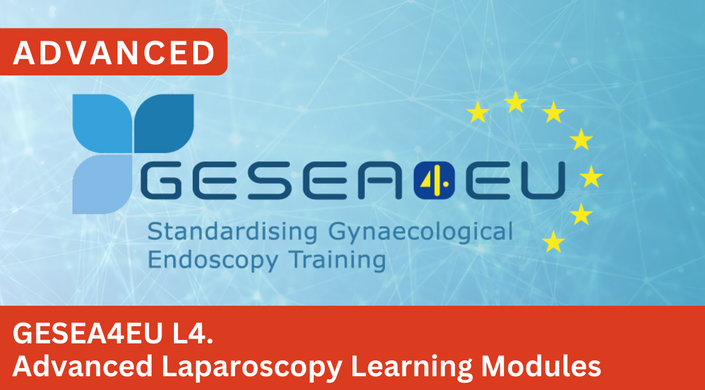
GESEA4EU L4. Advanced Laparoscopy Learning Modules
The advanced laparoscopy module is aimed at Specialist Professionals to provide them with knowledge in in four subspecialties: oncology, endometriosis, urogynecology, neuropelveology.
Enrolment in the course is possible only via a coupon.
To request a coupon please contact our team via [email protected]
Oncology e-learning
Objectives in terms of theoretical knowledge and topics:
- Laparoscopic anatomy of pelvic spaces, vessels and ureter
- Laparoscopic pelvic neuroanatomy: descriptive and functional
- Rules of exposure in laparoscopy
- Surgical rules of vessels dissection
- Surgical rules of ureteral dissection
- Surgical rules of pelvic nerves dissection
- Technique of total laparoscopic hysterectomy and radical laparoscopic hysterectomy
- Technique of pelvic and lomboaortic lymphadenectomies
- Principles of nerve sparing
- Intraoperative management of vascular and ureteral complications
Endometriosis e-learning
Objectives in terms of theoretical knowledge and topics:
- Laparoscopic anatomy of pelvic spaces, vessels and ureter
- Laparoscopic pelvic neuroanatomy: descriptive and functional
- Diagnosis approach in endometriosis regarding pain and functional disorders (urinary, digestive, sexual)
- Rules of exposure in laparoscopy
- Surgical rules of ureteral dissection
- Surgical rules of pelvic nerves dissection
- Different techniques to manage ovarian endometrioma
- Techniques of laparoscopic management in rectovaginal endometriosis (shaving, colorectal resection)
- Techniques of laparoscopic management in bladder and ureteral endometriosis
- ntraoperative and Postoperative management of vascular, digestive and urinary complications
Urogynecology e-learning
Objectives in terms of theoretical knowledge and topics:
- Anatomy and landmarks required for the surgery of laparoscopic POP repair. (promontory, lateral spaces, RV and VV spaces, Retzius space)
- Laparoscopic pelvic neuroanatomy: descriptive and functional
- Laparoscopic suturing in prolapse surgery
- Techniques of sacrocolpopexy and of lateral suspension (Dubuisson, pectopexy)
- Importance of nerve sparing approach
- Management of difficult cases
- Management of recurrences
- Prevention and treatment of complications
- Management of UI and POP surgery
- Technique of laparoscopic Burch colposuspension
Neuropelveology e-learning
Objectives in terms of theoretical knowledge and topics:
- Laparoscopic anatomy of somatic and autonomic pelvic nerves: descriptive and functional
- Architecture and microanatomy of peripheral nerve
- Diagnosis approach in pelvic pain and functional disorders (urinary, digestive, sexual)
- Surgical rules in peripheral nerve dissection
- Technique of nerve sparing according to surgical indications
- Technique and different type of neurolysis in endometriosis entrapment of somatic nerves
- Principles of pelvic neuromodulation
- Indications and technical principles of the implantation of neural electrodes on the pelvic nerves (LION procedures).
PLEASE VIEW BELOW THE FULL COURSE CURRICULUM
Course Curriculum
L4. Advanced Laparoscopy
Available in
days
days
after you enroll
-
StartLaparoscopy Advanced Laparoscopy Pelvic Neuroanatomy Basic Knowledge for Surgical Approach (38:56)
-
StartAdvanced Laparoscopy Endometriosis E-Learning Technical Principles on DIE (32:23)
-
StartAdvanced Laparoscopy Neuropelveology E-Learning Nerve Sparing Surgeries and Surgical Rules in Peripheral Nerve Dissection (39:53)
-
StartAdvanced Laparoscopy Urogynecology E-Learning Standard Technique of Laparoscopic Sacrocolpopexy (54:17)
-
StartAdvanced Laparoscopy Endometriosis E-Learning Ureteral Endometriosis (17:18)
-
StartAdvanced Laparoscopy Urogynecology E-Learning Management of Complications in POP Laparoscopic Surgeries (69:45)
-
StartAdvanced Laparoscopy Oncology SLN (24:25)
-
StartAdvanced Laparoscopy Oncology Lumboaortic Lymphadenectomy (27:10)
